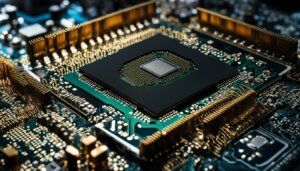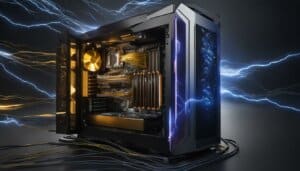Table of Contents
When delving into the world of electronics, you may come across the term MHz. But what does it actually mean? In this article, we will explore the concept of MHz and its significance in the realm of technology.
Firstly, MHz stands for megahertz, which is a unit multiplier representing one million hertz (106 Hz). It is commonly used to measure frequency in electronics. Hz, on the other hand, is the standard unit of frequency in the International System of Units (SI) and is used to measure electromagnetic radiation and vibrations, such as sound.
Heinrich Hertz, a renowned German physicist, played a crucial role in the development of the concept of hertz as a unit of measure. Through his experiments, Hertz confirmed James Clerk Maxwell’s theory of electromagnetism, paving the way for the use of hertz to describe the frequency of wave cycles.
Megahertz, or MHz, simplifies the measurement and comparison of frequencies by providing a convenient reference point for larger amounts. It makes it easier to quantify and understand the frequencies involved in various technological applications.
While MHz is commonly associated with the measurement of radio waves within the range of 1 MHz to 999 MHz, it also finds relevance in other fields. For example, MHz is used to measure sound waves that exceed the range of human hearing and is employed in medical imaging using ultrasounds.
Furthermore, MHz plays a crucial role in computing. It is used to measure the clock speed of central processing units (CPUs), which directly impacts the performance of computer hardware components. The higher the clock speed, the faster the CPU can execute instructions, resulting in enhanced processing capabilities.
By understanding what MHz represents and its applications in various domains, we can gain a deeper appreciation for the role it plays in the ever-evolving world of technology.
Importance of Clock Speed in Computing
In computing, clock speed plays a crucial role in determining the performance of a computer’s central processing unit (CPU). Clock speed refers to the speed at which a CPU can execute instructions per second, measured in megahertz (MHz) or gigahertz (GHz).
A higher clock speed means that the CPU can process instructions more quickly, resulting in better performance and faster execution of tasks. It directly impacts the number of instructions a processor can execute per second, as each instruction requires a certain number of clock cycles to complete.
However, it’s important to note that clock speed is not the sole factor that determines a computer’s performance. Other aspects such as CPU architecture, cache size, and the number of cores also play significant roles.
Advancements in technology have allowed for improvements in CPU efficiency and capabilities without solely relying on increasing clock speeds. This means that a CPU with a lower clock speed but optimized architecture and other features can still deliver impressive performance.
When comparing CPUs, it is essential to consider factors beyond clock speed to accurately assess performance. These factors include the number of cores, cache size, and architecture.
“Clock speed is not the only factor determining a computer’s performance.”
Over time, the importance of clock speed has evolved, and other factors have gained significance in determining CPU performance. CPU manufacturers have focused on developing more efficient and powerful architectures rather than solely relying on increasing clock speeds.
It is worth mentioning that some enthusiasts engage in overclocking to increase a CPU’s clock speed beyond its factory-set limits. While this can result in better performance, it carries risks such as increased heat generation and decreased component lifespan.
Comparison of CPUs with Different Clock Speeds
| CPU Model | Architecture | Clock Speed (GHz) | Number of Cores | Cache Size (MB) | Performance |
|---|---|---|---|---|---|
| Intel Core i5-9400F | Coffee Lake | 2.9 | 6 | 9 | Excellent |
| AMD Ryzen 7 3700X | Zen 2 | 3.6 | 8 | 32 | Outstanding |
| Intel Core i9-10900K | Comet Lake | 3.7 | 10 | 20 | Exceptional |
Clock Speed and Graphics Processing Units (GPUs)
Clock speed plays a vital role in the performance of graphics processing units (GPUs). In a GPU, clock speed refers to the frequency at which the cores and shader units operate, typically measured in megahertz (MHz) or gigahertz (GHz).
A higher clock speed in a GPU enables the cores and shader units to perform calculations and process graphical data more rapidly. This results in enhanced graphics rendering and overall GPU performance, making it an essential factor in gaming performance.
However, while clock speed is important, it is not the only determining factor of GPU performance. Other factors such as the number of shader units, memory bandwidth, and GPU architecture also influence gaming performance.
Over time, the significance of clock speed in GPUs has evolved. Today, shader core count and specialized units have gained prominence alongside clock speed. These factors collectively contribute to the overall capabilities and gaming performance of a GPU.
FAQ
What does MHz stand for?
MHz stands for megahertz, which is a unit multiplier representing one million hertz (106 Hz) and is commonly used to measure frequency in electronics.
What is the significance of hertz (Hz) in measuring frequency?
Hertz is the standard unit of frequency in the International System of Units (SI) and is used to measure electromagnetic (EM) radiation and vibrations such as sound.
Who inspired the name “hertz” as a unit of measure?
Heinrich Hertz, a German physicist, was the inspiration behind the name “hertz” as a unit of measure, after his experiments confirmed James Clerk Maxwell’s theory of electromagnetism.
How does the hertz unit describe wave cycles?
The hertz unit describes the frequency of wave cycles, like radio waves and sound waves, by indicating the number of cycles that pass through a given point in one second.
Why are multipliers such as megahertz (MHz) used for referencing frequencies?
Multipliers such as megahertz (MHz) make it easier to reference larger amounts, simplifying the measurement and comparison of frequencies.
What is the range of frequencies in the radio wave range?
Frequencies within the range of 1 MHz to 999 MHz are part of the radio wave range in the electromagnetic spectrum.
In what other contexts is megahertz (MHz) used for measuring frequencies?
Megahertz is also used in measuring sound waves that exceed the range of human hearing and in medical imaging using ultrasounds.
How does clock speed impact CPU performance?
Clock speed refers to the speed at which a CPU can execute instructions per second, measured in megahertz (MHz) or gigahertz (GHz). A higher clock speed means that the CPU can process instructions more quickly, resulting in better performance and faster execution of tasks.
What factors should be considered when evaluating CPU performance beyond clock speed?
While clock speed is important, other factors such as CPU architecture, cache size, and the number of cores also play significant roles in determining a computer’s performance.
How does clock speed affect GPU performance in gaming?
Clock speed in graphics processing units (GPUs) refers to the frequency at which the GPU’s cores and shader units operate, measured in megahertz or gigahertz. A higher clock speed allows the GPU to process graphics-intensive tasks at a faster rate, resulting in higher frame rates and smoother gameplay.
Are there other factors besides clock speed that influence GPU performance in gaming?
Yes, factors such as the number of shader cores, memory bandwidth, and architecture also impact gaming performance in GPUs.
Can CPUs and GPUs be overclocked to increase clock speeds?
Yes, both CPUs and GPUs can be overclocked to increase clock speeds and potentially improve performance. However, caution and proper cooling are required, and overclocking may void warranties.
What should be considered when evaluating a GPU’s capabilities beyond clock speed?
When evaluating a GPU’s capabilities, it is important to consider factors such as overall specifications, architecture, and feature set, in addition to clock speed, for an accurate assessment of performance.









